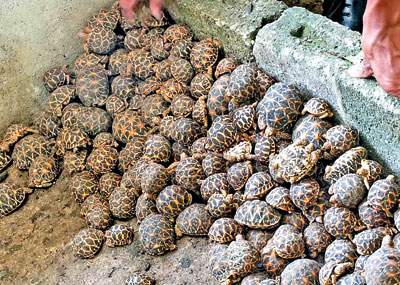News
Sri Lanka wants star tortoise under ‘species threatened with extinction’
The star tortoise which is facing numerous threats including smuggling should be put under ‘species threatened with extinction’ of the Convention on International Trade in Endangered Species of Wild Fauna and Flora (CITES).

Dr. Anslem de Silva with a star tortoise
This is the strong plea from a team of Sri Lankan researchers, as the countdown for the 18th CITES Conference begins.
The Conference of Parties of CITES is scheduled to be held at the BMICH in Colombo from May 22 to June 3 with the participation of over 3,000 delegates from 183 countries and this plea goes out from well-known reptilian researcher Anslem de Silva, Manori Gunawardena of the Environmental Foundation Ltd., Priyanthi Wijenayake of the Sri Lanka Customs, Dammika Malsinghe of theDepartment of National Zoological Gardens and Tharaka Prasad of the Department of Wildlife Conservation.
“We are urging that the star tortoise (Geochelone elegans), which is facing numerous threats, should be moved from CITES Appendix II to Appendix I,” says Dr. de Silva.
Appendix I includes species threatened with extinction and trade in specimens of these species is permitted only in exceptional circumstances. Appendix II, meanwhile, includes species not necessarily threatened with extinction, but in which trade must be controlled in order to avoid utilization incompatible with their survival.
Currently, the star tortoise is listed as ‘Vulnerable’ in the IUCN 2018 Red List and ‘Near Threatened’ by the Environment Ministry.
The team is also urging that star tortoises which have fallen victim to cross-border smuggling, be sent back home in keeping with IUCN (International Union for the Conservation of Nature) and CITES guidelines.
When large hauls of these beautiful creatures are confiscated during detections of rampant attempts by the Indo-Lanka smuggling mafia, serious issues are faced, the team points out.

Some of the 2,089 star tortoises captured off Kalpitiya and kept at the Gonawela Zoo (Photo by Dr. Anslem de Silva)
Giving the background, Dr. de Silva says that all confiscated chelonians (tortoises and turtles) are being kept in the country and some are released in the national parks where they will breed with local populations. This will increase the likelihood of disease transmission.
“Finding the manpower and budgets to house and feed thousands of chelonians, mainly star tortoises, is likely to be a major problem for the Department of National Zoological Gardens,” he says, with the team recommending that responsible international organizations should take steps to repatriate the confiscated animals to their relevant countries,
There is also a danger of the local star tortoises becoming extinct due to threats such as road kills, being killed for their flesh, falling victims of brush movers and also suffering grievous injuries from agricultural implements, Dr. de Silva points out, reiterating that this would be aggravated by star tortoises being collected from the wild for smuggling.
Detailing the current situation, he says that the star tortoise is a protected reptile under the Fauna and Flora Protection Ordinance and listed in CITES Appendix II since 1975, allowing international trade only if export permits are issued by the country of origin. Sri Lankan legislation only permits the export of specimens for non-commercial purposes such as research or zoological garden displays.
“The increasing illegal poaching and trading activities indicate active vigilance of law enforcement authorities. But we do not know how many smugglers escaped from the law and whether this is only the tip of the iceberg,” he says.
A 2017 study published in ‘WILDLANKA’ had found that there was evidence both from Sri Lanka and India that smuggling of animals was a well-established criminal operation and that Sri Lanka was being used as a base by organized crime syndicates of the chelonian smuggling triangle.
This study stated that it is possible that these reptiles are smuggled out to Far Eastern countries (Malaysia, Thailand, China and Japan) and western countries like the United States of America (USA) and in Europe for the pet trade and for medicinal purposes.
Dr. de Silva cites a few recent cases of smuggling of star tortoises – two separate Sri Lankans caught attempting to smuggle out through the airport, 124 star tortoises and 488 hatchling star tortoises to Malaysia respectively and another Sri Lankan trying to smuggle out 41 live star tortoises to Thailand; with the most recent case being the seizure of 304 star tortoises in January 2019, once again at the airport.
The biggest haul was, probably, 2,089 star tortoises packed in seven travelling bags intercepted five nautical miles from Kalpitiya and another 1,200 in Kalpitiya in 2017.
Incidentally, Dr. de Silva has published the first book on the star tortoise in 2003 which has become a popular seller in the US. While he has a number of scientific papers on this subject to his credit, he was the sole representative from Sri Lanka at the IUCN/SSC (World Conservation Union) Red Listing Workshop for South and Southeast Asian Tortoises and Freshwater Turtles held at the Zoological Gardens, Singapore recently.

